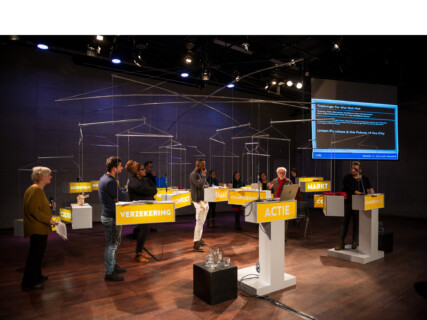This talk begins from a seminal, albeit heavily contested, essay by economist and writer Francis Fukuyama, titled “The End of History?” (1989). Published a few months before the fall of the Berlin Wall, in its anticipation of the end of the Cold War it concluded that history had come to an end, because the competing ideological and economic systems of the so-called first and second world were converging into one model of “capitalism-plus-democracy.” History was no longer necessary, because the world had achieved its best possible form. In it, any problems or conflicts would be resolved simply by economic collaboration and common marketization of relations.
Fast forward some three-odd decades, and we could not be further away from this illusion. As the word “permacrisis” enters our dictionary as the most defining word of this time—to name an extended period of instability and insecurity we find ourselves in—can we think of the current moment, paradoxically perhaps, as the end of the end of history? Or better yet: as the beginning of history? What, then, is the shifting role of art in the world reentering history as it is fighting for survival?
To engage with this questions, Maria Hlavajova will think with, about, and through art using this frame of speculative periodization. By doing so, she will delve into a number of recent projects at BAK, basis voor actuele kunst, Utrecht, including Propositions for Non-Fascist Living (2017-ongoing), Trainings for the Not-Yet (with artist Jeanne van Heeswijk, 2019–2020), and Fragments of Repair (with Kader Attia, 2021–2022).
Maria Hlavajova is an organizer, researcher, educator, curator, and founding general and artistic director of BAK, basis voor actuele kunst, Utrecht (since 2000). Between 2008 and 2016, she was research and artistic director of the collaborative research, exhibition, and education project FORMER WEST, which culminated in the publication Former West: Art and the Contemporary After 1989 (which she co-edited with Simon Sheikh, 2016). Hlavajova has instigated and (co-)organized numerous projects at BAK and beyond, including the series Propositions for Non-Fascist Living (2017–ongoing), Future Vocabularies (2014–2017), New World Academy (with Jonas Staal, 2013–2016), among many other international research, education, exhibition, and publication projects. Her curatorial work includes Call the Witness, Roma Pavilion, 54th Venice Biennale, Venice, 2011; Citizens and Subjects, Dutch Pavilion, 52nd Venice Biennale, Venice, 2007; and Borderline Syndrome: Energies of Defense, Manifesta 3, Ljubljana, 2000. Publications she has (co-)edited include: Fragments of Repair (with Kader Attia and Wietske Maas, forthcoming 2023); Toward the Not-Yet: Art as Public Practice (with Jeanne van Heeswijk and Rachael Rakes, 2021); Deserting from the Culture Wars (with Sven Lütticken, 2020); Propositions for Non-Fascist Living: Tentative and Urgent (with Wietske Maas, 2019); Posthuman Glossary (with Rosi Braidotti, 2018); and Marion von Osten: Once We Were Artists (with Tom Holert, 2017), among others. She is a lecturer at HKU University of the Arts Utrecht, Utrecht and Academy of Fine Arts and Design, Bratislava. In addition, Hlavajova is co-founder (with Kathrin Rhomberg) of the tranzit network. Hlavajova is a member of the supervisory board of the Academy of Visual Arts, Prague and of the advisory boards of Bergen Assembly, Bergen and IMAGINART, Imagining Institutions Otherwise: Art, Politics, and State Transformation, University of Amsterdam, Amsterdam. In the recent past, Hlavajova served on the supervisory boards of European Cultural Foundation, Amsterdam and Stedelijk Museum, Amsterdam. She lives and works in Amsterdam and Utrecht.
